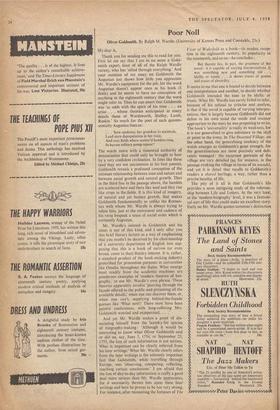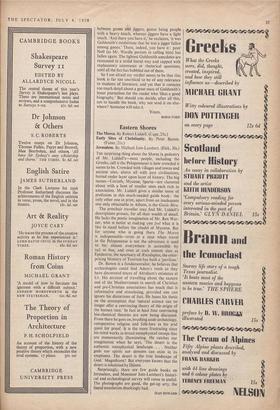Poor Noll
Oliver Goldsmith. By Ralph M. Wardle. (University of Kansas Press and Constable, 25s.) My dear A,
Thank you for sending me this to read for you. First let me say that I am in no sense a Gold- smith expert, least of all of the Ralph Wardle variety, who has 'sifted through everything.' And your mention of my essay on Goldsmith the Augustan just shows how little you appreciate Mr. Wardle's equipment for the job, for the word Augustan doesn't appear once in his book (I think) and he seems to have no conception of anything in the eighteenth century that the word might refer to. Thus he can assert that Goldsmith was 'at odds with the spirit of his time . . . an artist . . . whose theories anticipated in many details those of Wordsworth, Shelley, Lamb, Ruskin.' So much for the poet of such quintes- sentially Augustan lines as : . . . Seen opulence, her grandeur to maintain, Lead stern depopulation in her train,
And over fields where scatteed hamlets rose, In barren solitary pomp repose?
The words move with a measured authority of denunciation that could only be brought to bear by a very confident civilisation. In lines like these (and they are not uncommon in his best poems), Goldsmith reveals a profound conception of the intimate relationship between man and nature and between social growth and natural growth. Thus in the third line in the passage above, the hamlets are scattered here and there like seed and they rise like crops in the fields. It is this kind of imagery, of natural and yet human growth, that makes Goldsmith fundamentally so unlike the Roman- tics with whom Mr. Wardle is always trying to relate him, just as the movement and cadence of his verse bespeak a sense of social order which is eminently Augustan.
Mr. Wardle's interest in Goldsmith and his times is not of this kind, and I only offer you this brief literary lecture as a way of emphasising that you mustn't be deceived by his chairmanship of a university department of English into sup- posing that this is a book of narrow (or even broad, come to that) literary interest. It is, rather, a standard product of the book-making industry prescribed for promotion purposes in universities like Omaha throughout the States. What emerge most readily from the academic machines are ponderous examples of 'modern theories of bio- graphy,' to use Mr. Wardle's own phrase. These theories apparently involve 'piercing through the facade offered to the public and presenting all the available details,' when one can discover them, or, when one can't, supplying behind-the-facade guesses like 'What next? There must have been painful conferences, with long-suffering Mrs. Goldsmith worried and exasperated. . .
And yet Mr. Wardle makes a point of dis- sociating himself from the laundry-list species of biography-making : 'Although it would be interesting to know what Oliver Goldsmith said or did on, say, June 5, 1754, or September 23, 1755, the loss of such information is not serious. What is important can be clearly inferred from his later writings.' What Mr. Wardle clearly infers from the later writings is the solemnly important fact that Goldsmith, while travelling through Europe, was 'observing, comparing, reflecting, reaching certain conclusions.' I am afraid that the loss of day-to-day information is really a good deal more serious than Mr. Wardle appreciates, for it necessarily throws him upon these later writings and here he proves to be not very strong. For instance, after recounting the fortunes of The Vicar of Wakefield as a book—its modest recep- tion in the eighteenth century, its popularity in the nineteenth, and so on—he concludes : But therein lies, in part, the greatness of the novel : it is capable of varying Interpretations. It was something new and something old . idyllic or ironic . . . it shows traces of genius and traces of absurdity. . . .
It seems to me that one is bound to decide between one interpretation and another, to decide whether Goldsmith intended the tone to be idyllic or ironic. What Mr. Wardle has surely failed to infer, because of his refusal to criticise and analyse, is that if the novel is capable of varying interpre- tations, that is largely because Goldsmith did not define in his own mind the mode and manner appropriate to the story he was proposing to write. The book's 'universality' is really its weakness, for it is too generalised to give substance to the idyll or point to the irony. In The Deserted Village, on the other hand, the generalising tendency of the words emerges as Goldsmith's great strength, fOr the generalisations are most precisely and deli- cately managed : the recurrent portraits of the village are very detailed (as, for instance, in the passage evoking the village in terms of its sounds), and yet it is detail that recalls to Goldsmith's readers a shared heritage, a way, rather than a precise locality, of life.
The pity of it all is that Goldsmith's life provides a most intriguing study of the relation- ship between between Life and Letters. At the very least, at the 'modern-biography' level, it was a fantasti- cal sort of life that could make an excellent story. Early on Mr. Wardle quotes someone's distinction beiween goons and jiggers, goons being people with a heavy touch, whereas jiggers have a light touch. `And there you have it,' he exclaims, a was Goldsmith's misfortune that he was a jigger fallen among goons.' There, indeed, you have it : poor Noll (as Mr. Wardle persists in calling him) has fallen again. The lightest Goldsmith anecdotes are recounted in a stolid literal way and capped with explanatory comments or rhetorical questions, until all the fizz has bubbled out of them.
So I am afraid my verdict seems to be that this book is far too uncritical to be of any relevance to students of literature, and yet that it contains too much detail about a great mass of Goldsmith's lesser journalism for the reader who `likes a good biography.' But should you decide, after all this, not to handle the book, why not send it on else- where? Someone will take it.
Yours,
BORIS FORD























































 Previous page
Previous page